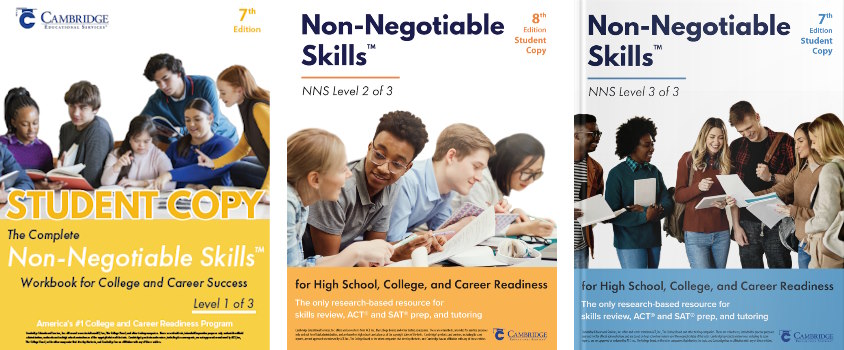Non-Negotiable Skills
Cambridge’s Non-Negotiable Skills™ (NNS), rooted in research and tailored to the needs outlined in The Forgotten Middle, ensures that students not only meet academic benchmarks but also cultivate essential skills for success beyond high school. Within our Skill Building materials, students access targeted resources designed to strengthen specific competencies highlighted in the NNS curriculum.
To speak with a consortium expert about special pricing, district rate or organizing a custom program, call us at (847) 299 2930 ext. 367 or click here

Cambridge’s Non-Negotiable Skills materials are built on College Readiness Standards™ and are effective at filling skill gaps and creating a firm foundation for further high school and testing success. These materials, available in comprehensive or subject-specific books, present content and practice for improvement in grammar, reading, writing, vocabulary, math, and science skills at each of three different levels:
- Non-Negotiable Skill Level 1 text: ACT 13-15 and SAT 730-870 score ranges
- Non-Negotiable Skill Level 2 text: ACT 16-19 and SAT 880-1020 score ranges
- Non-Negotiable Skill Level 3 text: ACT 20-23 and SAT 1030-1150 score ranges
Each unit focuses on mastering core academic skills through lessons, in-class practice, exercises, and two Mastery Quizzes for each subject. The Teacher’s guide supports the teacher in classroom instruction and practice as students build the four major skill areas: English, Mathematics, Reading, and Science. The teacher’s guide includes all student pages with correct answers highlighted and teaching tips for use in classroom lessons.
Non-Negotiable Skills™ PrepCast provides all the Non-Negotiable Skills content in a comprehensive online course that provides up to 60 hours of rigorous curricula for use in the classroom or at home. PrepCast contains highly engaging interactive videos, in-class practice, and independent practice opportunities to help students learn and master the skills they need to succeed in college and career. The curriculum is presented in three levels corresponding to three achievement bands defined by the College and Career Readiness Statements. This course is available on all devices, including computers, tablets, and smartphones so students have access wherever the internet is available. Student progress is tracked and all exercises are graded. Teachers can track student progress, time on task, individual results, and scoring.
- Level 1 score range: 13-15 ACT and 730-870 SAT
- Level 2 score range: 16-19 ACT and 880-1020 SAT
- Level 3 score range: 20-23 ACT and 1030-1150 SAT
Teacher Professional Development
Cambridge’s Test DeMystifier Professional Development gives teachers a thorough understanding of standardised tests. Teachers learn about test mechanics including the test structure and format; timing of each subject test – Reading, Writing and Language, English, Math, and Science; tested content and skills within each subject and in what proportion; and analysis of the new Essay, including the passage, prompt, and expectations. With practice problems in Reading, Writing and Language, English, Math, and Science teachers learn high-value test-taking strategies for items most frequently encountered on the test; how different forms of “data” are integrated throughout the tests; how to address student-produced response questions, and about evidence-based questions. Teachers also gain insight into the scoring of the tests and the aligned scale scores for any suite of exams.
Cambridge’s Introduction to Testing Readiness provides teachers with a thorough understanding of how to effectively prepare students using any one of Cambridge’s test preparation materials including Non-Negotiable Skills texts. Led by a Cambridge Master teacher and customized for your implementation model your teachers will analyze the Cambridge Course Concept Outline, understand the instructional layout and progression of the Cambridge materials, consider different course structures and timings, learn how to target instruction based on ability levels while incorporating building basic skills into your program, review applicable Item Indexes and Crosswalks to Standards, explore the mechanics of the applicable test in terms of test structure, timing, content, frequency and skills for each section of the test (e.g. Writing, Language, Reading, Math, and Science), learn best practices for implementing and differentiating instruction, and gain insight into question types, concepts tested, common distractors, and assigning homework. This professional development assumes use of Cambridge materials for a skill building or test preparation program.
Teachers will take a dive into their own students’ data to understand how to effectively use the Cambridge data reports (reports may include Student Summary and Item Analysis, Instructor Summary, Error Analysis, Content Distribution, Formative Connection, Lesson Plans, and others) to more effectively address skill gaps and target instruction. Topics include the pre-assessment process and the importance of timely and accurate feedback, linking assessment items to instructional objectives and differentiating among learners to drive score increases across the spectrum of achievement. Teachers will also learn powerful test-taking strategies to incorporate in the classroom.
Student and Family Workshops
The ScoreCelerator Workshop offers an intensive review of solid test taking techniques, high-value targets that offer the best return on preparation time, and powerful test-taking strategies. Students will learn how to avoid common errors and use the test structure to maximum advantage. Topics include:
- The mechanics of the test:
- How the test is written and scored
- How just a few more correct questions can dramatically increase scores – every problem matters,
- Common distractors
- A systematic analysis of each section of the test:
- Mapping of item types
- Timing and pacing of the test
- Proportion of problems
- The need to be a wise test-taker:
- In-depth strategies
- How to get the best return on preparation and practice
- Workshop practice problems are used illustrate test mechanics and strategies
The Student Motivation Workshop encourages students to set high expectations for educational and personal goals, and to start planning for the future now. Emphasizing the importance of good test scores and conscientious preparation to build a competitive application, students learn the impact education has on career choices and earnings, today’s top jobs and in-demand college degrees, how to maximize opportunities for admission and financial aid, and the importance of solid practice and preparation for the challenges of standardised tests.

